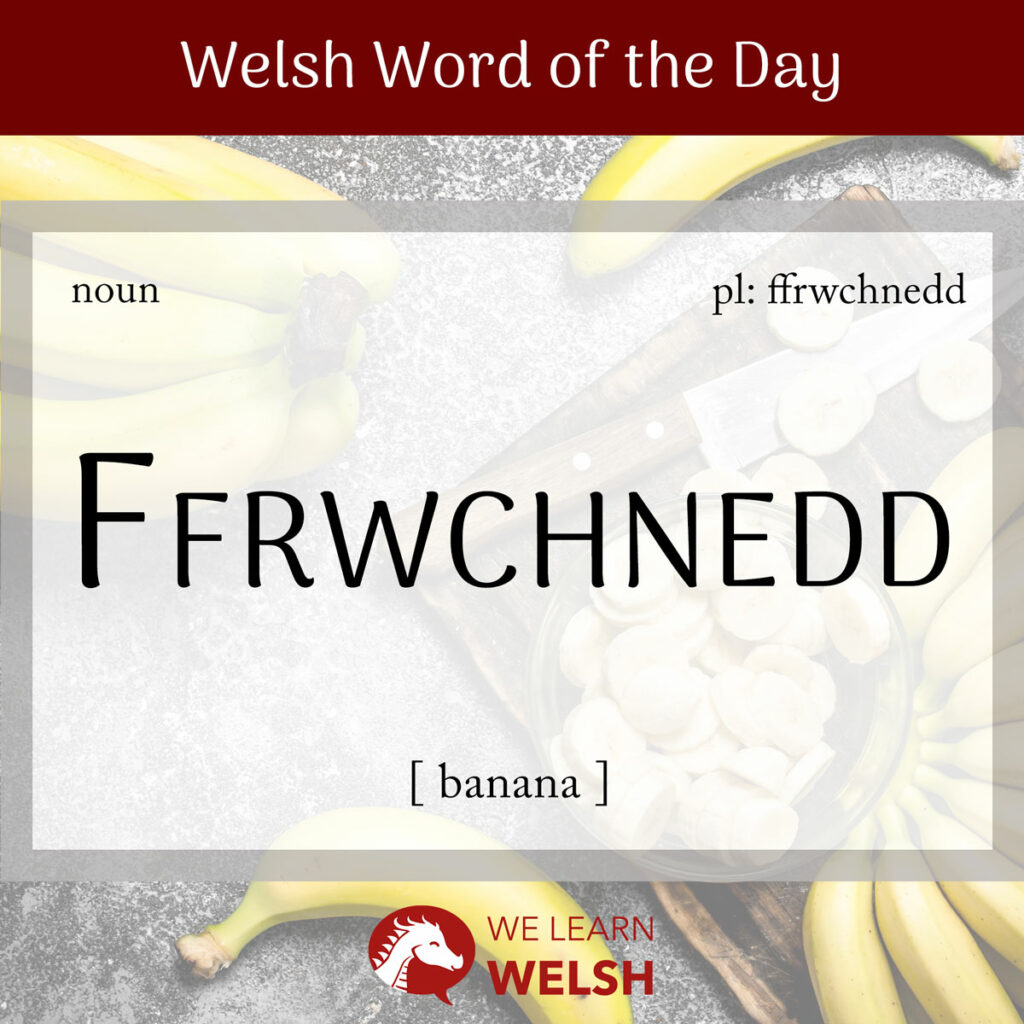It’s a well-known phenomenon for Welsh words or phrases that are only used as a jôc (joke) or slang to be misrepresented to the rest of the world as standard, everyday words. One infamous example is the pysgod wibli-wobli (jellyfish), usually called sglefren fôr, seren bigog, or cont y môr in Welsh. (The last, though surprisingly common, is best avoided in polite conversation!)
You might not be aware of the example on which this article is based, though. We’re talking about ffrwchnedd, a rarely used word for a banana or bananas, usually called simply banana / bananas in a borrowing from English. Most people don’t even know it exists, and those who do usually think it’s ‘more correct’ than bananas!
ffrwchnedd
banana / bananas (jocular)
Where ffrwchnedd comes from exactly is unclear, but most people agree that it is an artificial construction, surfacing in the late twentieth century.
One essay on Welsh iaith (language), by Iwan Wmffre, tells a story whereby an English ieithydd (linguist) heard Welsh native speakers using the English word banana and was horrified that there was no ‘real’ word for banana in Welsh.
Some say the gair (word) was then invented by English speakers in indignation at this lack on the part of the Welsh, while others insist it was an inside jôc developed by the Welsh ourselves, in response to the former. Those credited range from Eisteddfod goers at Castell Nedd (Neath) to Swansea-born musician and comedian Dewi Pws.
And what it means is a mystery too – though one suggestion is an explosion of nits!
Ffrwchnedd is not the only gair Cymraeg (Welsh word) to be magicked up out of thin air. An incredibly interesting episode in the history of y Gymraeg (the Welsh language) is that of William Owen Pughe.
Pughe was a scholar of Welsh gramadeg (grammar) and ieithyddiaeth (linguistics) who produced a large amount of literature on the topic. He was clearly a very patriotic man (he was Welsh himself, and from Gwynedd, a very Welsh-speaking area) and a lover of the iaith, but his approach to recording its use is now considered to have been very inaccurate.
He was also very gullible, for example having been convinced by ffugiwr (forger) Iolo Morganwg to publish a number of phoney literary manuscripts written by Morganwg himself.
When producing his geiriaduron (dictionaries), Pughe is known to have often included new, un-attested geiriau (words) that he’d himself invented to cyfieithu (translate) concepts that didn’t yet have a Welsh word for them. Most of these fell by the wayside and are no longer used.
However, many of them did actually make sense and were based on real Welsh root words, meaning that there were quite a few that stuck and now have a place in the language – amgueddfa (museum), ffrwydro (to explode) and nodwedd (characteristic) all come from Pughe. You may think this is very diddorol (interesting), and even more so when you learn that diddorol is yet another Pughe creation!
Pughe’s diary, written in Welsh, is available to view at Llyfrgell Genedlaethol Cymru (the National Library of Wales) in Aberystwyth.
Gofynnais Mam am ysgytlaeth ffrwchnedd, ond ‘naeth hi jyst chwerthin!
I asked Mum for a ‘banana’ milkshake, but she just laughed!
As time passes, many people have come across the word ffrwchnedd innocently and believed it to be a more authentic translation of banana, so you’ll hear a lot of well-intentioned learners and second-language speakers using the word, unaware that it started out as a joke.
But most Welsh dictionaries will not record the existence of ffrwchnedd, and it makes sense that a non-native ffrwyth (fruit) like a banana would borrow an English word (which is originally West African anyway… )
It’s a rather ironic story – originally coined by purists who opposed loanwords, it has now become a bit of a pet peeve for both native speakers and sticklers for accuracy alike.
Banana is the word used exclusively by any Welsh speaker I’ve ever met. So please do ask for a banana hollt (banana split) or discuss the politics of a gwlad fananas (banana republic) without worrying that you’re poisoning the language with English – it’s completely correct.
But you may occasionally come across the existence of ffrwchnedd on a menu, either as a mistake or as a conscious joke. You can have a giggle knowing that you’re sharing the laugh with amused native speakers across the country!


